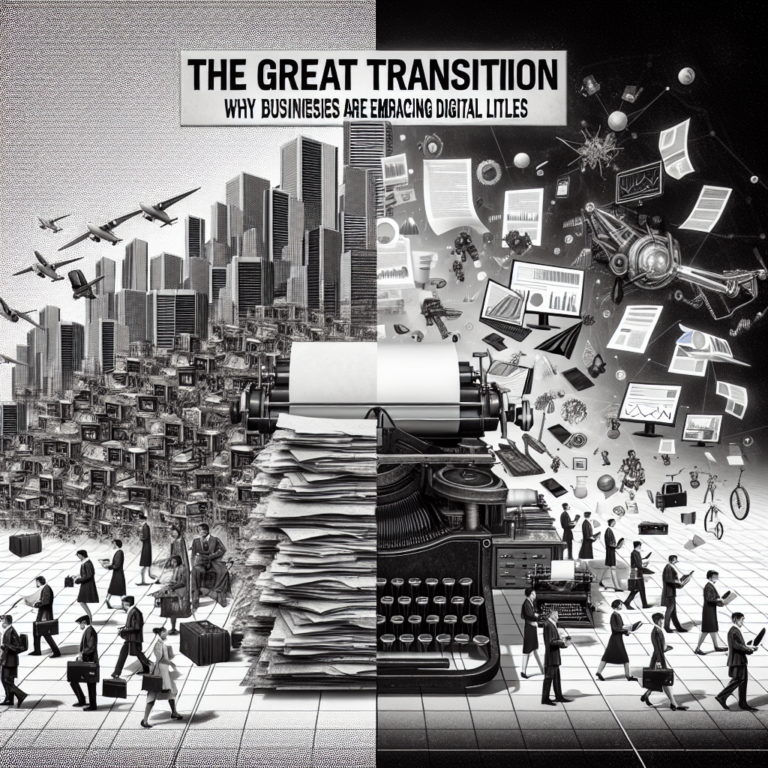The rise of technology has paved the way for an innovative transformation across various sectors, and one of the most significant shifts is in the realm of business operations. As we move further into the 21st century, the adoption of digital titles is becoming more prevalent among companies striving to keep pace in an increasingly competitive landscape. This article explores the reasons behind this great transition and the benefits that digital titles bring to businesses.
Understanding Digital Titles
Digital titles refer to the electronic versions of job titles, roles, and associated responsibilities that are shared and managed through digital platforms. Unlike traditional methods where titles were often communicated via paper documents or physical signage, digital titles are fluid, easily alterable, and often embedded within organizational software and online collaboration tools.
Why the Shift?
1. Enhanced Flexibility and Adaptability
In an ever-evolving market, businesses must remain agile to respond to changing trends and consumer demands. Digital titles provide the flexibility to quickly adjust roles and responsibilities as needed. For instance, in a dynamic project environment, teams can seamlessly reassign roles based on expertise and workloads without the bureaucratic delays associated with formal title changes in traditional settings. This allows organizations to maintain optimal productivity and responsiveness.
2. Improved Remote Collaboration
The global shift to remote work, accelerated by the COVID-19 pandemic, necessitated new forms of collaboration. Digital titles facilitate clear communication among team members regardless of their location, ensuring that everyone understands their roles and the roles of their colleagues. Cloud-based project management tools and collaboration platforms thrive on digital titles, allowing team members to know who to reach out to for specific tasks and responsibilities in real-time.
3. Streamlined Communication and Transparency
With digital titles integrated into organizational systems, communication becomes more streamlined. Employees can view their colleagues’ roles, responsibilities, and expertise at a glance, which fosters an environment of transparency and collaboration. This visibility aids in breaking down silos within organizations, promoting teamwork, and enhancing overall communication.
4. Data-Driven Decision Making
Businesses today are driven by data. Embracing digital titles allows organizations to leverage data analytics to gain insights into their workforce’s skill sets and productivity levels. By analyzing trends related to digital title usage and performance metrics, businesses can make informed decisions regarding promotions, training, and hiring. Monitoring employee roles in real-time helps companies identify skill gaps and emerging talents, facilitating proactive talent management.
5. Cost-Effectiveness
Digital titles reduce administrative burdens and streamline HR processes. In traditional settings, updating job titles often involves lengthy paperwork and significant time investment. With digital systems, changes can be made quickly and efficiently, minimizing administrative costs. This cost-effectiveness extends to onboarding processes as well—new hires can easily access their roles, responsibilities, and organizational structure digitally, accelerating their integration.
6. Enhanced Employer Branding
In a competitive labor market, businesses are eager to attract top talent. Digital titles can contribute to an organization’s employer branding efforts by showcasing its innovative culture. Companies that adopt modern technology and practices are often viewed as more appealing workplaces. This tech-savvy image can help attract digital-native job seekers who prioritize agility and progressive work environments.
7. Greater Inclusivity
Digital titles foster inclusivity by allowing organizations to embrace diverse roles that may not have traditional equivalents. For instance, roles like “Chief Happiness Officer” or “Content Wizard” reflect the evolving landscape of job responsibilities shaped by societal and technological changes. This flexibility promotes creative job definitions that can help in attracting diverse talent while addressing the unique needs of various employee segments.
The Future of Work
As businesses continue to adapt to the digital age, the embrace of digital titles will likely expand. Organizations will increasingly rely on this modern nomenclature to streamline operations and foster a connected, collaborative culture.
In conclusion, the great transition toward digital titles represents a significant leap in how businesses operate in today’s fast-paced digital landscape. These innovations promote flexibility, transparency, and inclusivity, ultimately paving the way for a more efficient and dynamic working environment. As technology continues to evolve, the role of digital titles will undoubtedly play a crucial part in shaping the future of work.


